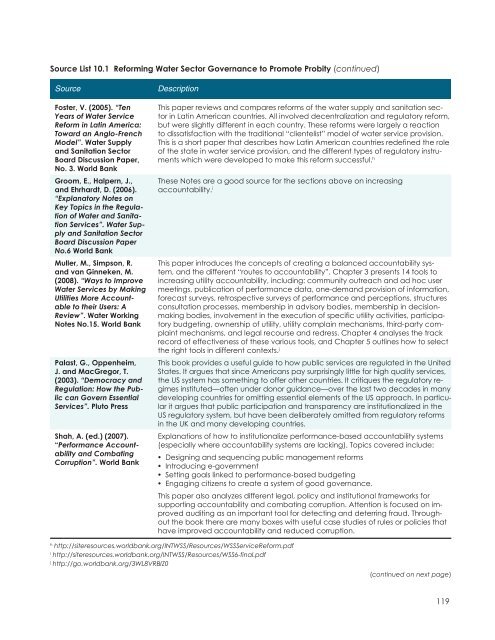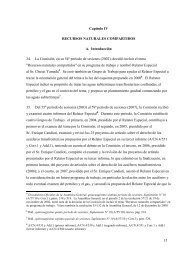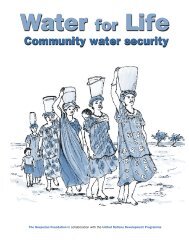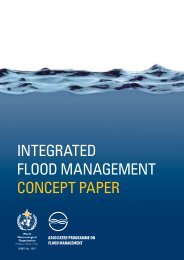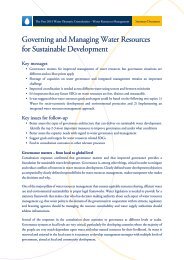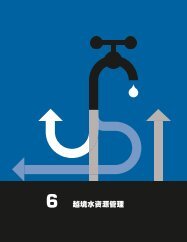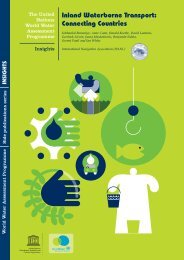A Sourcebook - UN-Water
A Sourcebook - UN-Water
A Sourcebook - UN-Water
Create successful ePaper yourself
Turn your PDF publications into a flip-book with our unique Google optimized e-Paper software.
Source List 10.1 Reforming <strong>Water</strong> Sector Governance to Promote Probity (continued)<br />
Source<br />
Foster, V. (2005). “Ten<br />
Years of <strong>Water</strong> Service<br />
Reform in Latin America:<br />
Toward an Anglo-French<br />
Model”. <strong>Water</strong> Supply<br />
and Sanitation Sector<br />
Board Discussion Paper,<br />
No. 3. World Bank<br />
Groom, E., Halpern, J.,<br />
and Ehrhardt, D. (2006).<br />
“Explanatory Notes on<br />
Key Topics in the Regulation<br />
of <strong>Water</strong> and Sanitation<br />
Services”. <strong>Water</strong> Supply<br />
and Sanitation Sector<br />
Board Discussion Paper<br />
No.6 World Bank<br />
Muller, M., Simpson, R.<br />
and van Ginneken, M.<br />
(2008). “Ways to Improve<br />
<strong>Water</strong> Services by Making<br />
Utilities More Accountable<br />
to their Users: A<br />
Review”. <strong>Water</strong> Working<br />
Notes No.15. World Bank<br />
Palast, G., Oppenheim,<br />
J. and MacGregor, T.<br />
(2003). “Democracy and<br />
Regulation: How the Public<br />
can Govern Essential<br />
Services”. Pluto Press<br />
Shah, A. (ed.) (2007).<br />
“Performance Accountability<br />
and Combating<br />
Corruption”. World Bank<br />
Description<br />
This paper reviews and compares reforms of the water supply and sanitation sector<br />
in Latin American countries. All involved decentralization and regulatory reform,<br />
but were slightly different in each country. These reforms were largely a reaction<br />
to dissatisfaction with the traditional “clientelist” model of water service provision.<br />
This is a short paper that describes how Latin American countries redefined the role<br />
of the state in water service provision, and the different types of regulatory instruments<br />
which were developed to make this reform successful. h<br />
These Notes are a good source for the sections above on increasing<br />
accountability. i<br />
This paper introduces the concepts of creating a balanced accountability system,<br />
and the different “routes to accountability”. Chapter 3 presents 14 tools to<br />
increasing utility accountability, including: community outreach and ad hoc user<br />
meetings, publication of performance data, one-demand provision of information,<br />
forecast surveys, retrospective surveys of performance and perceptions, structures<br />
consultation processes, membership in advisory bodies, membership in decisionmaking<br />
bodies, involvement in the execution of specific utility activities, participatory<br />
budgeting, ownership of utility, utility complain mechanisms, third-party complaint<br />
mechanisms, and legal recourse and redress. Chapter 4 analyses the track<br />
record of effectiveness of these various tools, and Chapter 5 outlines how to select<br />
the right tools in different contexts. j<br />
This book provides a useful guide to how public services are regulated in the United<br />
States. It argues that since Americans pay surprisingly little for high quality services,<br />
the US system has something to offer other countries. It critiques the regulatory regimes<br />
instituted—often under donor guidance—over the last two decades in many<br />
developing countries for omitting essential elements of the US approach. In particular<br />
it argues that public participation and transparency are institutionalized in the<br />
US regulatory system, but have been deliberately omitted from regulatory reforms<br />
in the UK and many developing countries.<br />
Explanations of how to institutionalize performance-based accountability systems<br />
(especially where accountability systems are lacking). Topics covered include:<br />
• Designing and sequencing public management reforms<br />
• Introducing e-government<br />
• Setting goals linked to performance-based budgeting<br />
• Engaging citizens to create a system of good governance.<br />
This paper also analyzes different legal, policy and institutional frameworks for<br />
supporting accountability and combating corruption. Attention is focused on improved<br />
auditing as an important tool for detecting and deterring fraud. Throughout<br />
the book there are many boxes with useful case studies of rules or policies that<br />
have improved accountability and reduced corruption.<br />
h<br />
http://siteresources.worldbank.org/INTWSS/Resources/WSSServiceReform.pdf<br />
i<br />
http://siteresources.worldbank.org/INTWSS/Resources/WSS6-final.pdf<br />
j<br />
http://go.worldbank.org/3WL8VRBIZ0<br />
(continued on next page)<br />
119


